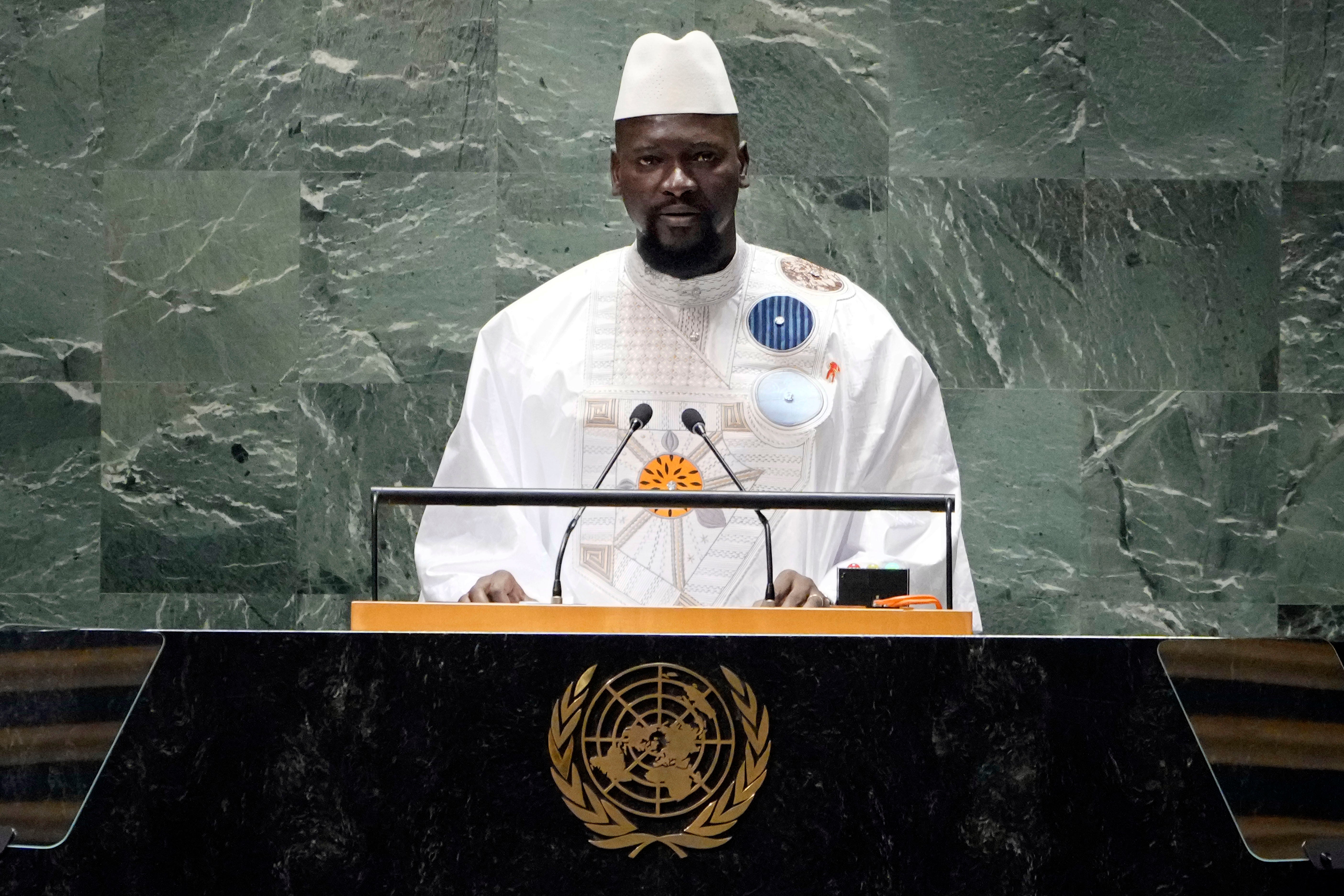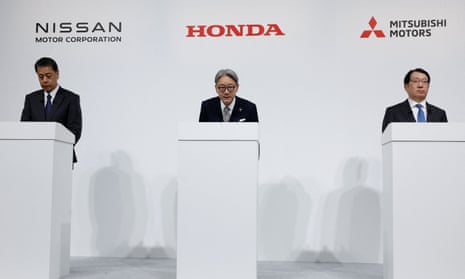Mamady Doumbouya has led the country since a 2021 coup. Some fear he has no intention of relinquishing power. Across Guinea’s capital, Conakry, billboards and posters proclaim the people’s loyalty to the vision of Mamady Doumbouya, the general who has led the west African country since a coup in September 2021. The iconography is omnipresent. Along the Fidel Castro highway, the posters hang on poles that rise out of piles of rubbish. Near the grand mosque, one poster is accompanied by the gnomic inscription “Your silence is precious, your eyes reassuring”. Another, bearing an image of him shaking Xi Jinping’s hand at a meeting in Beijing in September, has the caption: “Welcome back Mamady Doumbouya, our pride.”.
![[Billboard with leader’s image and lettering in French that reads: march of unity and peace. It is erected over a streetside market with stalls selling fruit, vegetables and other goods beneath sunshade umbrellas]](https://i.guim.co.uk/img/media/9645af855d59305f225ffba886282b9ec9a9ea5c/0_857_5712_3427/master/5712.jpg?width=445&dpr=1&s=none&crop=none)
For many in Guinea’s political opposition and civil society, the reverential messaging is a distraction from the junta’s increasingly authoritarian exercise of power and an ominous sign that Doumbouya has no intention of relinquishing power. “Each of us is afraid for his own safety,” said Abdoulaye Kourouma, the head of the opposition Rally for Renaissance and Development party. “Whether you are a scientist, a university scholar, a leader of opinion, a very good journalist, no one speaks today.”.
![[Portrait of Abdoulaye Kourouma: he sits on an ornate couch with black and gold frame and wears a white tunic with blue embroidery down the front]](https://i.guim.co.uk/img/media/c3f085084fa720afb2a8c058edfdd849c6cd25a9/0_742_5712_3427/master/5712.jpg?width=445&dpr=1&s=none&crop=none)
Many people initially welcomed the coup that deposed Alpha Condé, who had controversially altered the constitution in 2020 to enable him serve a third five-year term. Under international pressure, the new military leaders initially pledged to hold a constitutional referendum and hand power to elected civilians by the end of 2024. But neither promise was fulfilled, and in the meantime a steady flow of opposition figures and civil society members have been detained or brought before the courts.
![[A police officer stands guard: he wears camouflage shirt and trousers, a beret and dark glasses, and stands by a minivan with a broken windscreen. A woman walks behind him carrying a large container on her head and there are stalls under umbrellas in the background]](https://i.guim.co.uk/img/media/5b730dda98cb3d804c181683b86d136f69718e9d/0_407_6108_3665/master/6108.jpg?width=445&dpr=1&s=none&crop=none)
The coup was one of multiple military takeovers that have taken place across central and west Africa since 2020. In Gabon and Guinea, the military acted after civilian leaders discarded term limits or manipulated elections. Across the region, junta leaders have either delayed promised elections or, as in Chad, compromised polls to ensure their own transformation into civilian presidents. In his new year’s address, hours after the junta’s own two-year timetable for holding elections expired, Dombouya said 2025 would be “a crucial electoral year to complete the return to constitutional order”. A few days later, the junta’s spokesperson, Ousmane Diallo, said the referendum and elections would possibly happen in May and December respectively.
![[A local market: women sit by a wall under sunshade umbrellas surrounded by large bowls of onions while others sell peppers, aubergines, tomatoes and other goods behind them]](https://i.guim.co.uk/img/media/7792f4ab8a733c99280ba3e82367b6e2a8e2df05/0_0_5629_3378/master/5629.jpg?width=445&dpr=1&s=none&crop=none)
However, last Thursday Diallo said it would be “impossible to hold all the elections in 2025” and that the process would start with a constitutional referendum that would take place “before the end of the first half of the year”. Joachim Millimono, a spokesperson for the main opposition, the Union of Democratic Forces of Guinea (UDFG), said the junta was unwilling to even talk about the text of the referendum, or update the electoral list from 2020. “There is no visible will of the transitional authorities for a return to constitutional order,” he said.
![[Mamady Doumbouya and Paul Kagame meet in New York, September 2023]](https://i.guim.co.uk/img/media/d1c0a67ed67dc560d2f6ae60d9c10a2aed1481aa/0_728_7287_4372/master/7287.jpg?width=445&dpr=1&s=none&crop=none)
The lack of clarity over the transition triggered a protest in the middle of January, during which one person died in the course of a crackdown by security forces. In the aftermath of the protest, the junta has further militarised the city. Checkpoints have been set up along the road running between the airport and the parliament building, where the military transition holds fort. In opposition strongholds such as Bomboly neighbourhood, where protests against the junta and the soaring cost of living have previously taken place, police officers stand on alert at major intersections.
Even though Doumbouya has not said whether he will contest the presidency, many expect him to. His critics speculate that he is strategically removing any opposition to his path through trumped-up charges and detentions. The UDFG leader, Cellou Dalein Diallo, for example, lives in exile after corruption charges were brought against him from his time as transport minister two decades ago. Other actors “have automatically joined the [junta transition council] or are afraid to take positions, precise and clear, on the transition,” said Alseny Sall, spokesperson for the Guinean Organisation for the Defence of Human and Civil Rights.
Local people say the muzzling of Guinean voices since 2021 has been masterminded by the defence minister, Aboubacar Sidiki Camara (widely known as “Idi Amin” (after the late Ugandan dictator) and another Doumbouya ally, Col Mouctar “Spartacus” Kaba, who heads an elite military unit. More than 50 parties were dissolved last year by the junta and several media licences revoked. The activists Oumar Sylla and Mamadou Billo Bah have been missing since July, when they were arrested after calling for protests; their colleagues fear they may no longer be alive. Habib Marouane Camara, an investigative journalist abducted in December, has not been seen since. In January, a Kaloum court handed a two-year sentence to another opposition figure, Aliou Bah, for “insulting and defaming” the junta leader.





















